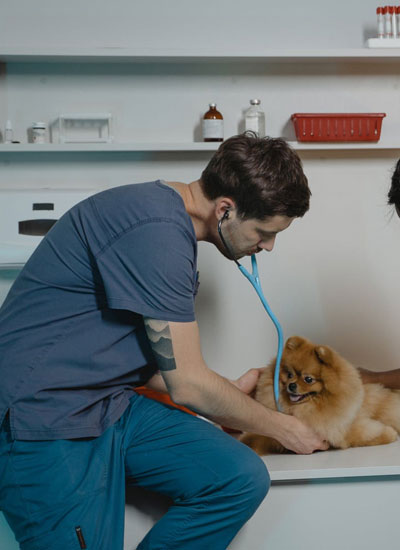
Veterinary is the study of the animal medical cure and the treatment that can save the life of the animal. This learning is all about examining the animal body health and finding out which disease is making them unhealthy and curing them with proper medical assistance. There are different kinds of injections, surgeries and medicinal doses sessions where the proper care is taken, and for better health, relaxation with a useful diet is provided to the animals; after this, the procedure is completed.
The requirements for veterinary courses vary depending on the institute one chooses to study at, but the majority are similar and basic that is required.
Candidates must have passed Class 10+2/Senior Secondary with science stream subjects which are Physics, Chemistry and Biology (Zoology and Botany).
The main requirement that a veterinarian must have in order to keep the animals healthy is hard work. This course is best suited to students who have a strong interest in animal care.
Degree courses typically take three years to complete after the 12th grade.
Popular Veterinary Courses

B.V.Sc & AH
BVSc AH is an 5½ years undergraduate program that comes under medical discipline. It deals with the study of medical diagnostics, and treatment of diseases of the animals. Students who have passed 10+2 or equivalent examinations with Physics, Chemistry, Biology, and English with a minimum of 50% marks from a recognized board of the country are eligible for admission into this course.
- Course Duration – 5 Years 6 Months
- Age Requirement – No Age Limit
- Subjects Required – 10+2 with Physics, Chemistry, Biology and English
- Selection Process – Merit-Based/Entrance Exam
- Employment Roles – Veterinary Doctor, Veterinary Research Scientist, Animal Breeders, Veterinary Officers, Veterinary Surgeon, Food Safety and Inspection Veterinarian, Food Animal Veterinarians etc.
Animal Husbandry Diploma
Diploma in Animal Husbandry is a two year/three-year full-time diploma course that focuses on imparting on-the-job training in animal care and breeding. The course curriculum of Diploma in Animal Husbandry covers different aspects of animal husbandry and dairying. Other important aspects of the course include Animal Nutrition, Animal Physiology, Genetics & Animals Breeding, Livestock Production
- Course Duration – 2 or 3 Years
- Age Requirement – No Age Limit
- Subjects Required –10+2 with Biology, Physics, Chemistry and Maths
- Selection Process – Merit-Based/Entrance Exam
- Employment Roles – Farm Supervisor / Clerk / Supervisor, Veterinarian, Dairy Farm Manager, Animal Dairy Farm Manager, Clinical Assistant etc.
know best college you can get with your score
Interested in Veterinary? Find information around eligibility, career scope, colleges and exams and much more for free.
Frequently Asked Questions

Diploma in Veterinary and Livestock Development Assistant, Diploma in Veterinary Pharmacy, etc.
BVSc, BVSc Animal Husbandry, BVSc Animal Nutrition, BVSc Veterinary Microbiology, etc.
There are different types of veterinarians. Small Animal Medicine and Surgery is a specialty area of some veterinarians that deals with pet animals. Other veterinarians work with agricultural animals and zoo animals. Then there are veterinarians who conduct research, vets who serve in the military, educators, private practitioners, and more.
Understanding mathematics and science will be very beneficial. In particular, biology and chemistry will prepare the student for the foundational concepts of college.
No matter how many years were spent in pre-professional or pre-veterinary training, a BVSc degree requires five years of study in the professional programme.
Alternative to preparing for and showing up for NEET, there is no other method to enrol in BVSc. The candidate’s exam results are used to determine whether they will be admitted.
Veterinarian is three to four times easier than MBBS. Animals can’t tell you what’s wrong, unlike people. Your understanding and treatment of them will improve as a result of the studies as a whole.
The level of responsibility in the job makes it potentially physically and mentally taxing. any minor injuries and physical dangers. The conditions in the workplace could change. It is frequently feasible to find temporary employment. Even though this is an isolated incident, prejudice based on gender may occasionally occur as more women become veterinarians.

